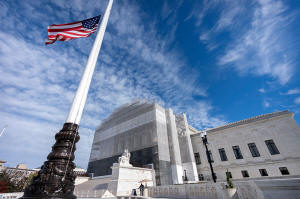Supreme Court meets to weigh Trump's birthright citizenship
restrictions, blocked by lower courts
[November 22, 2025]
By MARK SHERMAN
WASHINGTON (AP) — The Supreme Court is meeting in private Friday with a
key issue on its agenda — President Donald Trump ’s birthright
citizenship order declaring that children born to parents who are in the
United States illegally or temporarily are not American citizens.
The justices could say as soon as Monday whether they will hear Trump’s
appeal of lower court rulings that have uniformly struck down the
citizenship restrictions. They have not taken effect anywhere in the
United States.
If the court steps in now, the case would be argued in the spring, with
a definitive ruling expected by early summer.
The birthright citizenship order, which Trump signed on the first day of
his second term in the White House, is part of his administration's
broad immigration crackdown. Other actions include immigration
enforcement surges in several cities and the first peacetime invocation
of the 18th century Alien Enemies Act.
The administration is facing multiple court challenges, and the high
court has sent mixed signals in emergency orders it has issued. The
justices effectively stopped the use of the Alien Enemies Act to rapidly
deport alleged Venezuelan gang members without court hearings, while
they allowed the resumption of sweeping immigration stops in the Los
Angeles area after a lower court blocked the practice of stopping people
solely based on their race, language, job or location.

The justices also are weighing the administration's emergency appeal to
be allowed to deploy National Guard troops in the Chicago area for
immigration enforcement actions. A lower court has indefinitely
prevented the deployment.
Birthright citizenship is the first Trump immigration-related policy to
reach the court for a final ruling. Trump's order would upend more than
125 years of understanding that the Constitution’s 14th Amendment
confers citizenship on everyone born on American soil, with narrow
exceptions for the children of foreign diplomats and those born to a
foreign occupying force.
In a series of decisions, lower courts have struck down the executive
order as unconstitutional, or likely so, even after a Supreme Court
ruling in late June that limited judges’ use of nationwide injunctions.
While the Supreme Court curbed the use of nationwide injunctions, it did
not rule out other court orders that could have nationwide effects,
including in class-action lawsuits and those brought by states. The
justices did not decide at that time whether the underlying citizenship
order is constitutional.
[to top of second column]
|

An American flag flies at half-staff outside the Supreme Court Nov.
5, 2025, in Washington. (AP Photo/Mark Schiefelbein, File)

But every lower court that has looked at the issue has concluded
that Trump’s order violates or most likely violates the 14th
Amendment, which was intended to ensure that Black people, including
former slaves, had citizenship.
The administration is appealing two cases.
The U.S. Court of Appeals for the 9th Circuit in San Francisco ruled
in July that a group of states that sued over the order needed a
nationwide injunction to prevent the problems that would be caused
by birthright citizenship being in effect in some states and not
others.
Also in July, a federal judge in New Hampshire blocked the
citizenship order in a class-action lawsuit including all children
who would be affected.
The American Civil Liberties Union, leading the legal team in the
New Hampshire case, urged the court to reject the appeal because the
administration's “arguments are so flimsy," ACLU lawyer Cody Wofsy
said. "But if the court decides to hear the case, we’re more than
ready to take Trump on and win.”
Birthright citizenship automatically makes anyone born in the United
States an American citizen, including children born to mothers who
are in the country illegally, under long-standing rules. The right
was enshrined soon after the Civil War in the first sentence of the
14th Amendment.
The administration has asserted that children of noncitizens are not
“subject to the jurisdiction” of the United States and therefore not
entitled to citizenship.
“The lower court’s decisions invalidated a policy of prime
importance to the president and his administration in a manner that
undermines our border security,” Solicitor General D. John Sauer
wrote in urging the high court’s review. “Those decisions confer,
without lawful justification, the privilege of American citizenship
on hundreds of thousands of unqualified people.”
All contents © copyright 2025 Associated Press. All rights reserved
 |